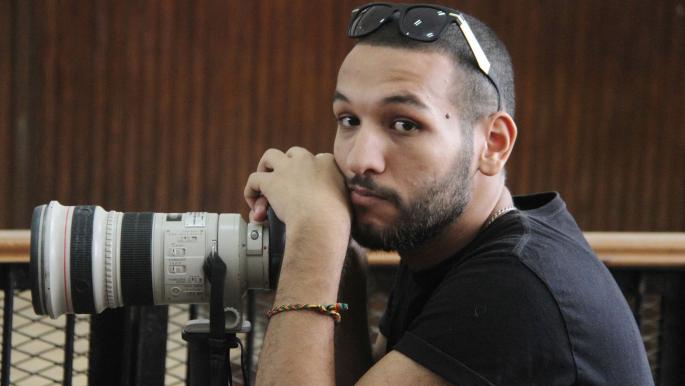In the events of the Al-Fateh Mosque, which erupted in opposition to the Rabaa Al-Adawiya massacre in the summer of 2013, Ibrahim Abdullah participated in the demonstrations that began in Midan Ramses in the heart of Cairo, and was arrested among thousands of others who protested against the military coup and the massacre.
Abdullah was sentenced to three years in prison for “demonstrating and inciting violence” and other ready-made charges in such cases. But he did not know that after the three years in prison, he would serve other life-long sentences, for as long as he was a former political prisoner in Egypt.
After Abdullah was released from prison, he faced extreme difficulties finding a job, even though he is a recent graduate engineer, and his major is required in the Egyptian labour market. Finally, he managed to get a job in a real estate company, the owner of which is inclined to the opposition and has in his family the experiences of former political prisoners, especially during the era of the current Egyptian regime. This was not the only obstacle that Abdullah faced, as he was a former political prisoner.
In one of the work assignments in which he travelled using company cars to the New Administrative Capital, he faced severe security obstruction from a traffic committee on the road, which detained him after he revealed his national number and it was found that he was a former political prisoner. The committee allowed everyone to cross, and he was transferred to the police station, and there he spent several days waiting for the National Security Agency to inquire about him.
In addition, every time he tried to marry a girl, her family refused to accept the marriage because he was a former political prisoner, not because they were loyal to the current regime, but because they feared any future consequences. Abdullah is not an exceptional case in Egypt. Rather, he is a straightforward example of the indefinite extended political punishment in Egypt for opposing the current Egyptian regime, even if this citizen stopped dissent completely, kept silent for a long time, and absolutely lost hope.
What happened a few months ago to the political activist Islam Orabi and his activist wife, Sarah Abdel Nasser, is another example of how the Egyptian regime deal with former political prisoners. The security authorities summoned Orabi because they were disturbed by his marriage without their knowledge. He was informed by phone before his arrest.
Sarah posted, through her own account on Facebook, the details of her husband’s forced disappearance before his appearance in connection with a political case, saying, “The National Security Agency summoned him, and the officer said him, “You got married, Islam… you got married without telling us? Bring with you the coupon and the ID card. Let’s talk. ” Security forces arrested Orabi in front of his house with his brother Ahmed on November 20, 2016, and then at noon on January 17, 2017, after an enforced disappearance of 85 days. At the time, they were included in a case on charges of establishing and joining an ISIS cluster cell.
After he was summoned by the security authorities at the end of last year and forcibly disappeared for five days, he appeared before the Shubra Al-Khaimah Prosecution Office. He was investigated as a defendant in Case No. 162 of 2020, a second Shubra Al-Khaimah misdemeanor. His imprisonment was renewed until a decision was issued to release him on February 16, 2021, with a bail of EGP 3,000 (about $190). However, Islam continued to be detained unlawfully in the Shubra Al-Khaimah Police Department headquarters again, and his wife was not allowed to visit him. He went on a hunger strike to protest his unlawful imprisonment.
According to a report issued by Amnesty International in January 2021, the Egyptian authorities refuse to disclose the number of prisoners in the country. It is estimated that the number is about 114,000 prisoners, which is more than twice the capacity of prisons, which Abdel Fattah Al-Sisi estimated in December 2020, at 55,000. The number of prisoners has increased dramatically following the overthrow of the late former President Mohamed Morsi in July 2013, which led to severe overcrowding in prisons. In the 16 prisons examined by the organisation, hundreds of prisoners are crammed into overcrowded cells, where the average space available for each prisoner is about 1.1 square metres, which is well below the minimum recommended by experts, which is 3.4 square metres.





Recent Comments